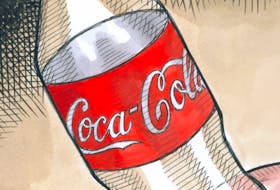Never underestimate the appeal of swag – even the cheap stuff.
People might have heard the story from the early days of the Beatles, when manager Brian Epstein, as the group was rapidly gaining fame, sold the rights to merchandising to a clever American entrepreneur for a very small percentage of sales.
It proved a colossal financial misstep for Epstein and the Fab Four when, over the next several years of Beatlemania, gross sales of such merchandise far outstripped revenue from concert tickets and records. People of a certain vintage will remember back to the days of items that ran from Beatle boots and wigs down to buttons, hair spray, tin lunchboxes and four-packs of cards wrapped up with a stale stick of bubblegum.
There were also bogus items, cheap knockoffs that might have gone under the radar by, say, using the misspelling in this context: Beetles. If it fit the budgets of some parents, such a gimmick probably did OK.
Never ones to miss a lick, the Canadian Senate has the crazy world of marketing and merchandising in their cross-hairs in their amendments to Bill C-45, regarding fine details around legalized cannabis, which the upper house will be voting on today. Not everyone is convinced they’re on the right track.
Proposed amendments include one that would prohibit the use of cannabis brand elements on promotional items that are not marijuana or marijuana accessories. The main purpose would be to limit the availability of such products as T-shirts, backpacks or other items with marijuana company logos, which sometimes appeal to minors.
But that has people in the budding new industry cautioning the Senate about possible unintended consequences. As it is, manufacturers will be restricted to plain packaging for the actual product, without graphics other than the logo and a health warning, similar to tobacco packs. And that’s a good thing. But Allan Rewak, executive director of the industry association Cannabis Council of Canada, says such a blanket stipulation could hamper manufacturers in other ways, such as barring the use of company logos on retail signage and promotional flyers.
And the complications could go beyond that, some warn, allowing black marketeers to get a foot in the door of sales.
Cam Battley, chief corporate officer for Aurora Cannabis, advised a more subtle approach in navigating this area of concern. After many decades of illegal cannabis sales – alongside merchandise that appeals to users and, arguably, might bend impressionable minds – one challenge will be to draw consumers away from the black market over to the regulated market.
That of course has been the main initiative behind legalization. To aid that, licensed producers need to do a certain amount of reasonable, restricted branding.
Adding to the argument, in another heavily regulated business, plenty of swag is available with the logos of alcohol brands, with no restrictions on those sales. Battley said those in the legal cannabis business don’t want to promote the use of their product among youth, but the same can’t be said of the underground market.
The senate certainly has a job to do. But it’s not good to overthink some of these points. They should heed the warnings of those who know how to do business.








